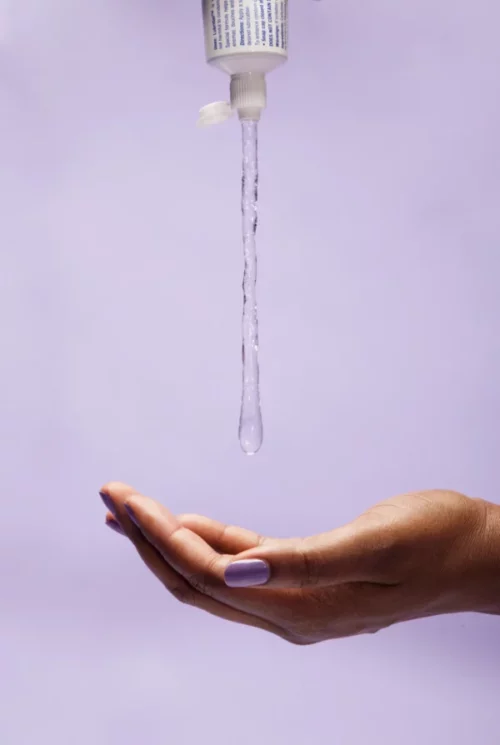With numerous types of lubricants out on the market, it can be overwhelming to choose the right one for you. You may have thought, “aren’t all lubes the same?” Actually, all lubes are not the same. There are different types of lube for different people, preferences, and purposes. Whether you’re looking to use one for penetrative sex, self-pleasure, or with a sex toy, it’s important to know which types are the best (and least harmful) option for your parts.
What is Lube?
Normally our body produces extra natural lubrication when we are sexually aroused. However, vaginal dryness can occur, which can make sexual activity very uncomfortable. Even if you don’t experience vaginal dryness, you might just be browsing for something that gives you more pleasure during penetration or masturbation. Personal lubricants can be a great solution since they reduce unwanted friction and increase sexual pleasure. The 4 main types of lubricants are: water-based, silicone-based, oil-based, and silicone-water (hybrid).
Water-based: This type of lube is known to be the most versatile and affordable. Out of the four types, it best resembles the consistency of the body’s natural lubrication. It’s also safe to use with toys and condoms. Unfortunately, they soak into your skin, which causes it to dry out quicker. Popular brands include Slippery Stuff, Good Clean Love Almost Naked, BabeLube Gel.
Silicone-based: This type is great for those with sensitive skin. It lasts longer than water-based lubes because it does not soak into your skin. A caveat to this lube is that using it with silicone toys may wear them out faster. Expect this lube to be very greasy when using it. Popular brands include Uberlube, Sliquid Naturals Silver, Turn On.
Oil-based: You can actually use most plant-based kitchen oils, such as olive oil, as a lube. It’s generally safe for the vagina and lasts longer than water lubes (but not as long as silicone). Other oil-based options include baby oil, petroleum jelly (Vaseline), and mineral oil, however, internal use with these is strongly discouraged since they can increase the risk for infection. Also do not use them with latex condoms!
Silicone-Water (Hybrid): This type is a happy medium between water and silicone-based lubes. It’s less irritating than water, but it’s not fully hypoallergenic. It lasts a long time, but not as long as silicone lubes. Unfortunately, there may be limited availability of this product outside of major sex stores. Brands include Sliquid, Tush Cush, Wet Gold.
How to Choose the Right One for You?
It’s important to know the determinants of choosing the right lube. These include sensitivities/allergies, pH levels of the vaginal and anal membranes, preferences, and purpose for using one.
Sensitivity/allergies: Sometimes it can be trial-and-error in finding the right lube. If you know how sensitive your skin is in general, then it might be a good idea to use a silicone lube since it’s hypoallergenic. Also avoid ingredients that may be harmful, such as glycerin, which can lead to yeast overgrowth and infection.
pH levels: Assessing vaginal pH can be helpful for evaluating vaginal health. The higher the pH (either due to menopause or other causes of decreased estrogen), the more susceptible the vaginal membrane becomes to BV (bacterial vaginosis), UTIs, or yeast infections. If this tends to be you, more acidic lubes (usually water-based) can cause irritation. You can test your vaginal pH with an at-home test kit.
Preferences/Purposes: Whether you want to use lube for masturbation or penetrative sex, you have options for how you want to experience the lube. Silicone-based lube will give you a significantly more slippery and long-lasting experience, but only if you don’t use it with a silicone toy. If you use toys often, water-based may be the way to go. Oils may be good for self-pleasure since it’s readily available, but it can get messy with more people involved.
Ultimately, your decision is all about weighing out the pros and cons after you’ve learned all about lubes!
Written by Kimberly Le, PT, DPT
References:
Hemalatha, R, et al. “Evaluation of Vaginal Ph for Detection of Bacterial Vaginosis.” The Indian Journal of Medical Research, Medknow Publications & Media Pvt Ltd, Sept. 2013, https://www.ncbi.nlm.nih.gov/pmc/articles/PMC3818598/#ref16.
Jr, Dennis Thompson, et al. “Choosing A Personal Lubricant – Menopause Center.” EverydayHealth.com, https://www.everydayhealth.com/sexual-health/choosing-personal-lubricant.aspx.
“Vaginal Lubrication: Uses, Benefits, Types, and Side Effects.” Medical News Today, MediLexicon International, https://www.medicalnewstoday.com/articles/326450.
















